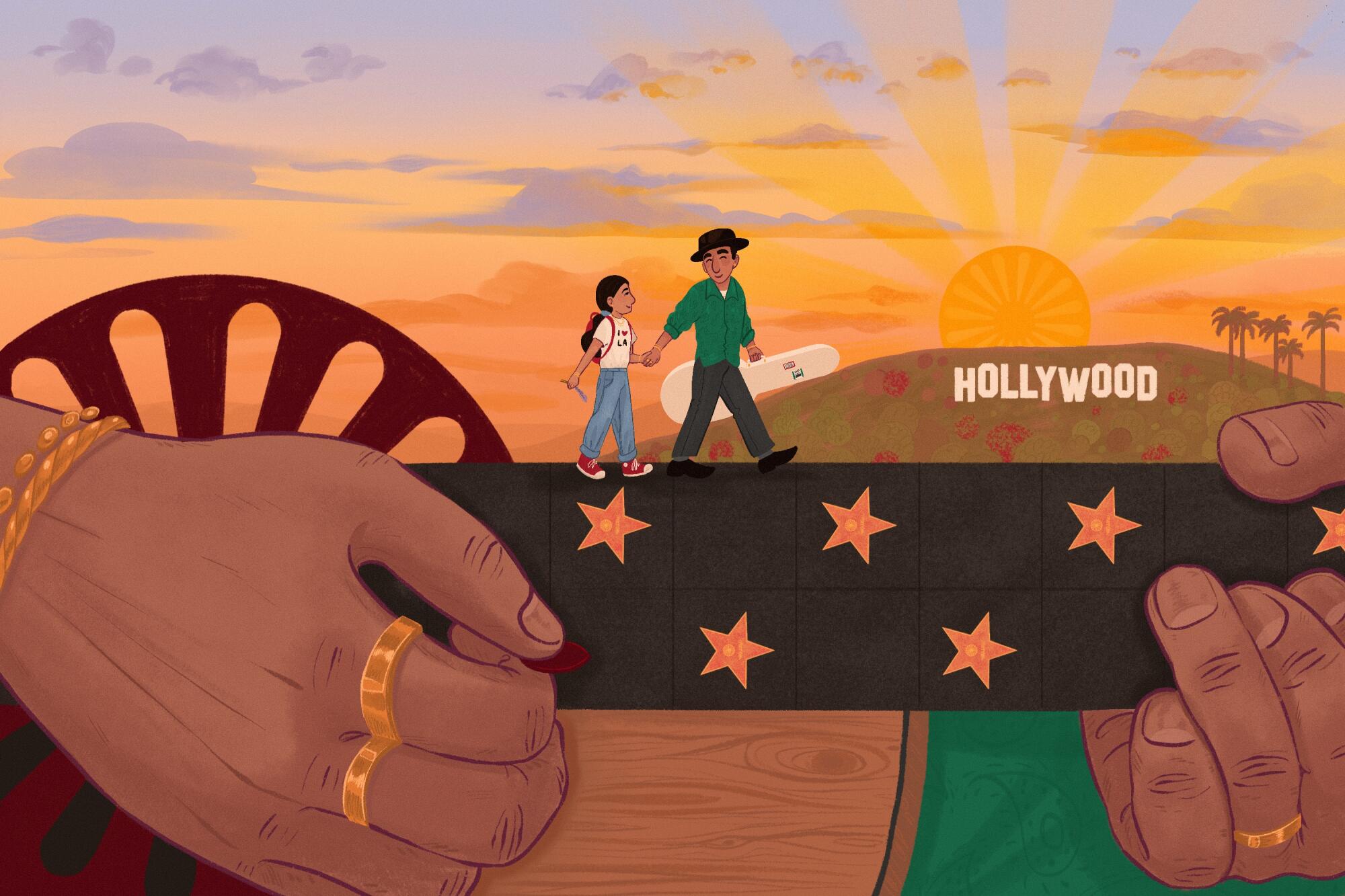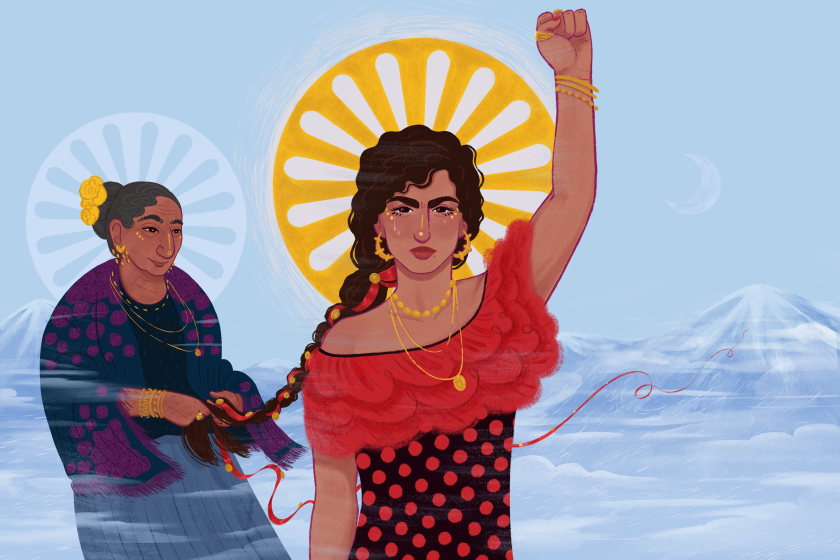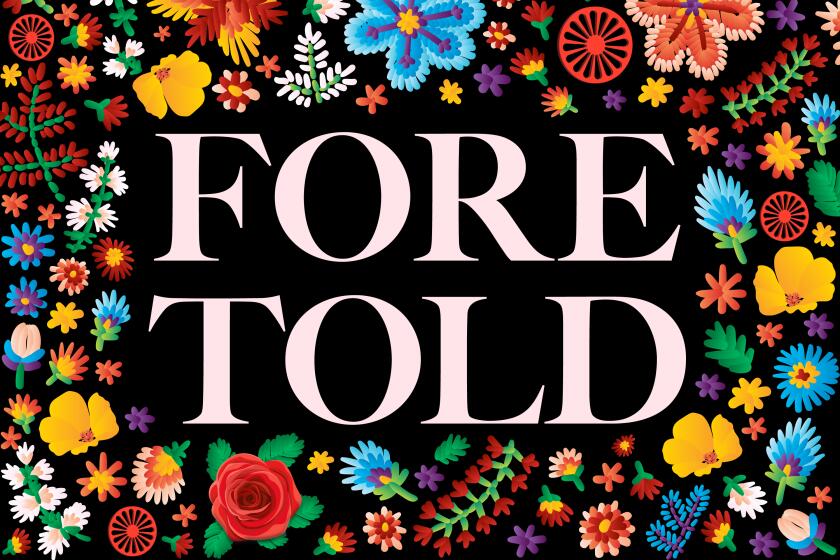
- Share via
In April 2022, I stood crying on the Hollywood Walk of Fame next to B.B. King’s star. Passersby gave me curious looks. “I’m OK,” I said to no one in particular, rubbing my eyes with the heels of my hands. After the long lockdown, I was finally able to resume my annual tradition of visiting Los Angeles to mark my family’s arrival in the United States. More than 30 years ago, my American story began in this very spot.
The place where I landed as a 15-year-old with my U.S.S.R. refugee parents is constantly changing. Still, whenever I have visited, the memories of my Californian teenagerhood swell with melancholy, transporting me back to 1989, to the city that inspired me to fearlessly embrace my multiethnic Romani identity.
I love Romani heritage and symbols of our unity, including our flag. But celebrating our history of resistance doesn’t mean erasing our unique individual identities.
Growing up, I hid my Romani, Ukrainian and Armenian roots to stay safe in Russia, where a conformist society spurned diversity, forcing its citizens to reject individuality. When we touched down in Los Angeles, I felt confused about my identity and assumed my parents did too. But I was surprised when they quickly welcomed their newfound liberation.
In May 1989, Dad and I made a memorable trip to begin his life as a “free Roma,” as he called it. When we stepped off the bus on Hollywood and Vine, he pointed down the street with, “Finally here!” It took him a week and a half to figure out the location of the star dedicated to his favorite musician, and he dressed up for the occasion. He wore leather pants, a green silk shirt and a black fedora — something he’d never do publicly in Russia, where he’d be harassed for dressing “too ethnically.” This was a pilgrimage to celebrate a hard-won victory over the Soviet oppression of minorities, though I didn’t know it then.

This is part of an occasional series on Romani communities. Listen to the podcast at latimes.com/foretold.
I had accompanied him simply out of concern that he might need help communicating in English, but the foreign world around us didn’t intimidate him. On the contrary, he marveled at the laid-back charms of Southern Cali, exclaiming appreciation for everything from Ripley’s Believe It or Not! to the gift shops bursting with trinkets. Then we found B.B. King’s star, and he grew contemplative. He looked away and lighted a cigarette. When he turned back, his eyes sparkled with tears. “Can you believe it?” he said. “We’re here.”
Back in Russia, Dad told us stories about King, who was born on a plantation in Mississippi in 1925. Like Black Americans, European Romani people have fought for basic freedoms for centuries. They withstood subjugation when their society demanded they erase their cultural identity, finding ways to thrive. King’s success as a Black American and musician resonated with my father, who, as a professional musician and a Roma, yearned for that same autonomy for all Romani people.
Still, as a teen preoccupied with MTV and American fashion, I couldn’t understand why he got so emotional standing on that busy sidewalk. I didn’t grasp the significance of his outfit, that King’s star represented not only triumph over tyranny or the freedom to embrace his Romani roots. It represented belonging. Adults have a knack for shielding their kids from trauma even as their own wounds bleed.
However, as an adult, returning to Hollywood year after year on a pilgrimage of my own, I eventually understood.
In her essay “Corpus Cartography,” sociologist Emma Patchett defined diasporic identity as “the disjunction between the dis/location of identity and the unstable territories of origins.” My home country insisted that mixed ethnicity made me problematic, that being Romani, especially, was a tragic flaw. No one’s ethnicity was as valuable as their Red Party affiliation. I grew up questioning my worth. Los Angeles showed me something different.
It taught me that diversity was a natural element of life, no matter how messy or inconvenient it felt to those who wished to suppress it.
My lessons on belonging started in the most unlikely places, such as our first American apartment building on Lexington Avenue, a gray-hued block with a courtyard pool. Apart from a retired American costume designer and his cuddly Pomeranian, the residents were immigrants like us. On the weekends, kids’ laughter reverberated around the building, followed by cannonball splashes into the pool. Aromas of coffee accompanied early morning conversations floating through the air: mostly Spanish, with a sprinkling of English or Armenian thrown into the mix. I’d never heard so many languages spoken openly and without reservations.
The ‘Foretold’ podcast follows Paulina Stevens, who was raised to be a fortuneteller in a Romani family in California, as she redefines her identity.
Astonished, my family soaked in this new world where everyone was uniquely different, like us. And the music blasting from the windows was also of different genres and languages. We spent our first weeks in America listening to the most beautiful and unfamiliar melodies. Dad would sit by the window and learn the tunes by ear on his guitar. Soon, the lively mariachi music and the hypnotizing lilts of Armenian duduk had a new addition: my father playing our own Romani romancie (chanson) songs, such as the famous “Dark Eyes.” Music was how I knew we were home.
Acceptance is like air; formless, yet necessary for the soul to thrive. The stereotype of the carefree, roaming Gypsy (a pejorative term) has been around for centuries. It’s perpetuated the dangerous idea that Romani people don’t want to belong, and it’s denied us basic rights and made us invisible. But we have always been ordinary people who’ve shared the same dreams as everyone else.
Last year, as I stood on Hollywood Boulevard, shapes of wide-eyed tourists and stoic locals flowing in rivulets around me, time slowed. I took a deep, shaky breath, recalling the moments when my life unfurled with possibilities I could’ve never imagined as a little Romani girl. But here I was, breathing out, in wonderment. Not an outcast, not alienated.
I belonged.
Oksana Marafioti is the author of “American Gypsy: A Memoir.” She is currently working on her second memoir about healing a multiethnic identity fragmented by cultural and intergenerational trauma. @oksanamarafioti
More to Read
A cure for the common opinion
Get thought-provoking perspectives with our weekly newsletter.
You may occasionally receive promotional content from the Los Angeles Times.










